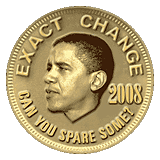 Ouch.
Ouch.A personal note, a couple of quotes, and a few links.
I became a Republican at 16 years old, when I received my first minimum-wage paycheck out of which was drawn Federal Taxes, State Taxes, union dues and a union initiation fee, all of which were mandatory. I became a real conservative in the late 1970s when I encountered Mr. Buckley's television show, Firing Line.
On Firing Line I saw manifest the "marketplace of ideas." And the delight, the joy, the brio with which Mr. Buckley engaged his liberal guests gave me a model to follow. Quite frankly, after watching Firing Line every other conservative talk fest has more than a whiff of pro wrestling about it.
I saw Mr. Buckley speechless only twice.
Once was when his guest was Mother Theresa. He asked, as television hosts will, to what address could his viewers send money to support her mission. She said that she didn't appear on his show to raise money, but to communicate what God would have her share. Mr. Buckley tried again, personalizing it to try to elicit a response, "Where would I send money for your work?"
Mother Theresa said, in that quavery voice, "I don't want you to give money. I want you to go out and look into the face of the poor."
To which Mr. Buckley had no reply.
A couple of quotes:
...if there were nothing to complain about, there would be no post-Adamite mankind. But complaint is profanation in the absence of gratitude. There is much to complain about in America, but that awful keening noise one unhappily gets so used to makes no way for the bells, and these have rung for America, are still ringing for America, and for this we are obliged to be grateful. To be otherwise is wrong reason, and a poetical invitation to true national tribulation. I must remember to pray more often, because providence has given us the means to make the struggle, and in this respect we are singularly blessed in this country, and in this room.
I was in a radio exchange with the senior U.S. liberal, Professor Arthur Schlesinger Jr., who in a casual survey of technology stunned me by saying that, in his judgment, "Word processing is the greatest invention in modern history." Suddenly I was face to face with the flip side of Paradise. That means, doesn't it, that Professor Schlesinger will write more than he would do otherwise?And a quote by Jonah Goldberg about Mr. Buckley's place in history:
In the next few days, there will be a wave of liberals — Frank Rich comes particularly to mind — who will use WFB's memory to beat up on today's conservatives....Liberals today bemoan how wonderful the conservatives of yesteryear were, solely to lament how terrible they are today. [My link -ed.] The recent bout of Goldwater nostalgia on the left was a perfect example. The strange new respect liberals have for Ronald Reagan would be another. And you can be sure they will use Buckley to that effect too.And for links, the best come from the online presence of Mr. Buckley's magazine:
That said, I'm delighted to have conservative heroes become simply American heroes. But it's at least worth pointing out that Goldwater, Reagan and, of course William F. Buckley were subjected to vicious criticism from the left in their day. That they belong to all Americans now is no small testament to their success in the face of often unrelenting opposition.
From the Editors "It has been said that great men are rarely good men. Even more rarely are they sweet and merry, as Buckley was.
A Symposium of Conservatives "The scene was slightly surreal, but it was an adventure and we were having fun. The gift of turning life into adventure was one of his charms, which helped attract young and old alike, but particularly the young, to his side. By merrily refuting liberalism, he gave birth to a conservatism, shaped in his own image, that avoided the drearily doctrinaire."
UPDATE: Nodding to Jonah Goldberg's point above (or, since this is in re: WFB, supra), Ross Dothat in The Atlantic writes:
Liberals tend to find kind things to say about men of the Right only once they're old and out of the arena, the better to contrast the decent conservatives of yore with the supposed right-wing pygmies of the present. But in Buckley's case the contrast is accurate, so long as we make it bipartisan: He was a giant, and no contemporary commentators, be they left or right or something else entirely, can hope to live up to the example he set, or the enjoy the impact he had. He didn't quite stop history, as he vowed half-jestingly to do, but he did manage to change it, and he will cast a long shadow over political journalism, and our politics in general, for as long as American history runs onward.



